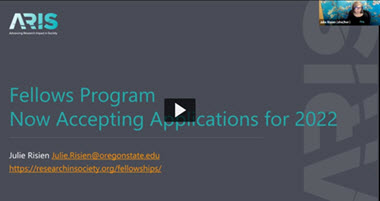2022 Call for Fellows
ARIS Center Fellowship Program 2022
The submission deadline was Sept. 30. No submissions are currently being accepted.
Purpose and Description
The ARIS fellows program is for professionals, researchers, faculty, educators, graduate students and others working to advance research impact practice. The goal of the program is to increase the quality and availability of scholarship and resources about research impacts through two types of projects. We support projects that: 1) synthesize existing scholarly work to package evidence into easily applied and digestible tools for the research community to improve research-impacts design and practice; and/or 2) small-scale innovative scholarship that explores new horizons and advances knowledge about research impact practices. Both types of projects require recipients to create products such as guidance documents, white papers, scholarly articles, decision support tools, multimedia supports, instructive videos, or other creative or scholarly outputs. Fellows are provided three types of support over the course of approximately one year:
- Participation in a community of fellows working to advance research impacts;
- Peer-review and editing of products under development along with publishing/production and dissemination support;
- A small stipend to offset the cost of fellowship work and/or fellowship-related travel.
ARIS will recognize the work of fellows on the Center website, at the annual Summit, and with a letter to your organizational leadership.

